Part One: The Children of the eldest brother and sister, Cornelius Vanderbilt and Margaret Vanderbilt Shephard
The eight offspring of William Henry Vanderbilt set the benchmark for luxurious living in gilded age New York, forever intertwining the name Vanderbilt with opulence and wealth. Nowhere was this more evident than in their palatial Manhattan residences, instrumental in transforming the fashionable precincts of Fifth Avenue from a thoroughfare of brownstone sobriety into a marble and limestone clad Epcot of fantasy mansions, derived from every imaginable historical style. Few of these urban palaces, built to last centuries managed to survive their owners, succumbing within decades to the swiftly changing modern word around them (see earlier post). A more tangible legacy comes from the many offspring produced by the brothers and sisters. This next generation took up the mantel from their parents, contiuing to embellish the family’s reputation as leaders of the smart set. Many of these cousins also had residences in New York City when they came of age.
Given their sheer number (not to mention some of their parents’ propensity for spending the majority of their own fortunes) few had the resources to build their own homes on quite the same scale as the generation before them. Fortunately, grand townhomes were often the parental nuptual present of choice. Others took a more modern tack, taking up housekeeping in luxury hotels and apartment buildings that were becoming a socially acceptable alternative to maintaining a mansion in town. Although by and large most of these Vanderbilt domiciles were a step down in splendor from those of the generation before them, they were nonetheless undeniably impressive. Luckily for us, many still stand to this day. They not only to give us a glimpse of the world their owners were born into, they also serve as a reference of the scale of their parents homes, which dwarfed these “petit palais” in both size and grandeur. I will be taking a look at some over the next couple of posts.
Cornelius Vanderbilt, the eldest of William Henry's children, was one of the principal heirs to his father's fortune, residing at the fabled, now demolished 1 Wst 57th St. with his family.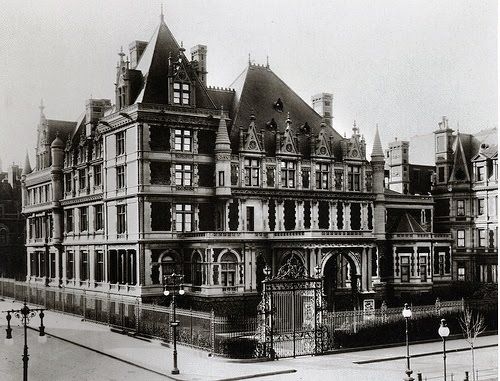 He had seven children, the two firstborn predeceasing him. Upon his death, he left his second oldest surviving son Alfred at least $42 million, with another $30 million to be split equally between his wife and three of the four remaining children.
He had seven children, the two firstborn predeceasing him. Upon his death, he left his second oldest surviving son Alfred at least $42 million, with another $30 million to be split equally between his wife and three of the four remaining children.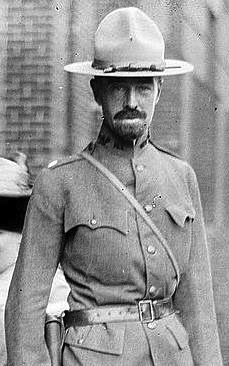 This left his eldest surviving son and namesake Cornelius Vanderbilt Jr, out in the cold with a comparatively paltry $1.5 million. Cornelius incurred his father’s wrath and subsequent financial exile by marrying the effervescent Grace Wilson, of whom the family strongly disapproved. The young couple was able to live and entertain quite ably all the same, thanks to the largess of Mrs. Ogden Goelet, Grace’s elder sister, who loaned them use of the seldom-occupied Goelet Mansion at 608 Fifth Avenue.
This left his eldest surviving son and namesake Cornelius Vanderbilt Jr, out in the cold with a comparatively paltry $1.5 million. Cornelius incurred his father’s wrath and subsequent financial exile by marrying the effervescent Grace Wilson, of whom the family strongly disapproved. The young couple was able to live and entertain quite ably all the same, thanks to the largess of Mrs. Ogden Goelet, Grace’s elder sister, who loaned them use of the seldom-occupied Goelet Mansion at 608 Fifth Avenue. After their father died, his brother Alfred settled another $6 million on him to avoid any legal challenge to the will, which brought his fortune up to the level of his other siblings, and allowed he and his wife to establish themselves in quite a handsome townhouse of their own at 677 Fifth Avenue, smack dab in in the heart of Vanderbilt Row.
After their father died, his brother Alfred settled another $6 million on him to avoid any legal challenge to the will, which brought his fortune up to the level of his other siblings, and allowed he and his wife to establish themselves in quite a handsome townhouse of their own at 677 Fifth Avenue, smack dab in in the heart of Vanderbilt Row.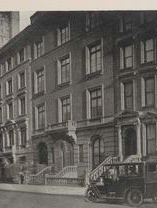 In 1914 Grace and Cornelius serendipitously inherited one of the largest of the family’s homes, 640 Fifth Avenue, from his Uncle George, who died without male issue. Eager to live on the regal scale they (well, primarily Grace) thought they were due, they wasted little time in having society architect Horace Trumbauer extensively remodel the house and put 677 on the market. With the business invasion of Fifth Avenue in the 50’s well underway, it was sold to developers, who soon razed it and erected a commercial building in its place, today home of Fendi.
In 1914 Grace and Cornelius serendipitously inherited one of the largest of the family’s homes, 640 Fifth Avenue, from his Uncle George, who died without male issue. Eager to live on the regal scale they (well, primarily Grace) thought they were due, they wasted little time in having society architect Horace Trumbauer extensively remodel the house and put 677 on the market. With the business invasion of Fifth Avenue in the 50’s well underway, it was sold to developers, who soon razed it and erected a commercial building in its place, today home of Fendi.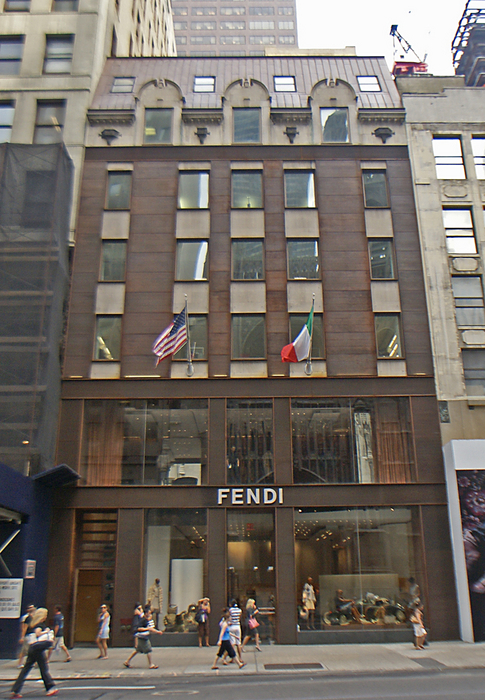
 Gertrude Vanderbilt, the eldest daughter, had the (financial) good fortune to marry Harry Payne Whitney whose family was just as rich as the Vanderbilts and literally grew up across the street from her in a multi-gabled mansion at 2 West 57th Street.
Gertrude Vanderbilt, the eldest daughter, had the (financial) good fortune to marry Harry Payne Whitney whose family was just as rich as the Vanderbilts and literally grew up across the street from her in a multi-gabled mansion at 2 West 57th Street.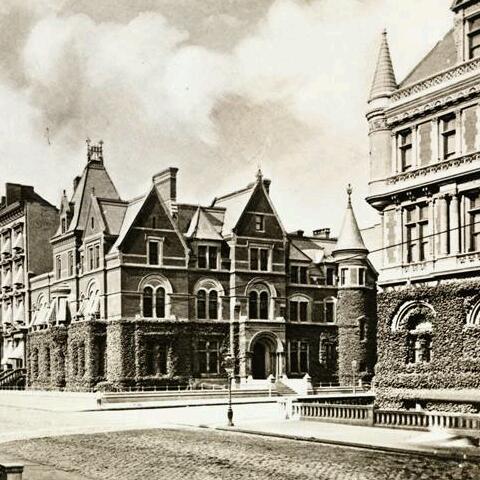 His father gave the newlyweds that house, where they lived for a number of years. As grand as her that home was, Gertrude moved up a notch on the architectural scale when she and her husband acquired her father-in law’s second home at 871 Fifth Avenue, an urban palace on the same scale as 640 Fifth, after his death.
His father gave the newlyweds that house, where they lived for a number of years. As grand as her that home was, Gertrude moved up a notch on the architectural scale when she and her husband acquired her father-in law’s second home at 871 Fifth Avenue, an urban palace on the same scale as 640 Fifth, after his death.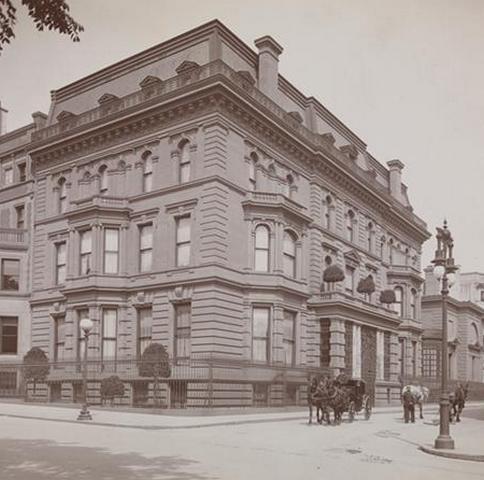 She resided there until her death in 1942 after which the mansion was soon razed.
She resided there until her death in 1942 after which the mansion was soon razed. 
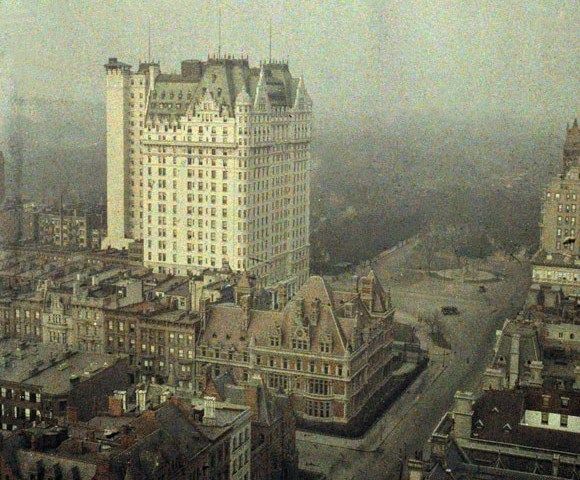 Although he leased townhouses from time to time in the city, he never bought another or built one, preferring to live in hotel suites when in town, the last one in the Vanderbilt Hotel (which he conveniently owned, and stands to this day, albeit converted to office use) before his tragic early death on the Lusitania in 1915.
Although he leased townhouses from time to time in the city, he never bought another or built one, preferring to live in hotel suites when in town, the last one in the Vanderbilt Hotel (which he conveniently owned, and stands to this day, albeit converted to office use) before his tragic early death on the Lusitania in 1915.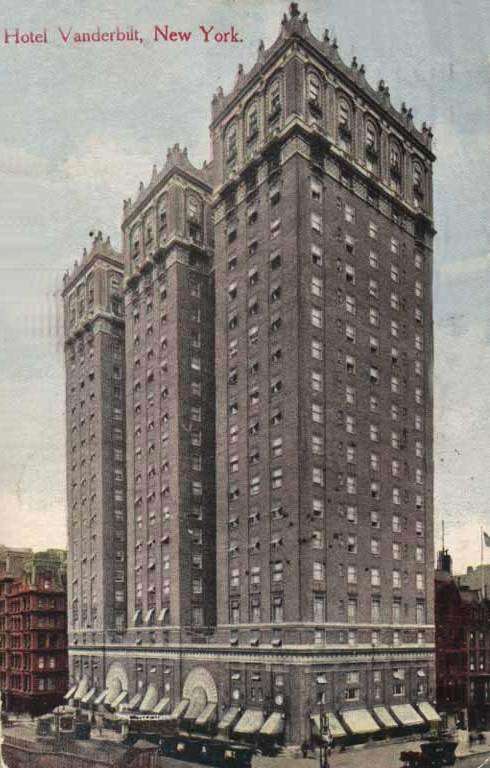 Interestingly, it did not take long for his widow (the former Margaret Emerson McKim)
Interestingly, it did not take long for his widow (the former Margaret Emerson McKim) to buy a townhouse on Park Avenue(no longer standing), following a more traditional pattern.
to buy a townhouse on Park Avenue(no longer standing), following a more traditional pattern.
The youngest daughter Gladys (in true gilded age heiress form) married a titled nobleman and established her residence in Budapest, which left the youngest son Reginald (probably better known today as the father of Gloria Vanderbilt).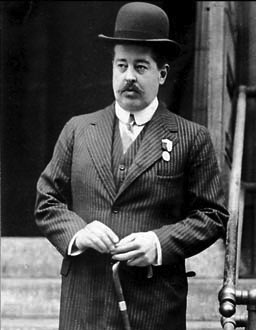 A raffish rake with a weakness for horses, women and gambling (not necessarily in that order), he managed to spend every cent he inherited that was not held in trust. Although he was constantly in financial trouble, and often had to be bailed out by his mother, he managed to live quite handsomely. He and his first wife began their married life by leasing this handsome 5 story townhouse at 22 East 72nd St.
A raffish rake with a weakness for horses, women and gambling (not necessarily in that order), he managed to spend every cent he inherited that was not held in trust. Although he was constantly in financial trouble, and often had to be bailed out by his mother, he managed to live quite handsomely. He and his first wife began their married life by leasing this handsome 5 story townhouse at 22 East 72nd St. At the time his death 20 years, later, he lived with his 2nd wife, the former Gloria Morgan in this townhouse nearby at 12 East 77th street, which had to be sold rather quickly to pay off his debts.
At the time his death 20 years, later, he lived with his 2nd wife, the former Gloria Morgan in this townhouse nearby at 12 East 77th street, which had to be sold rather quickly to pay off his debts.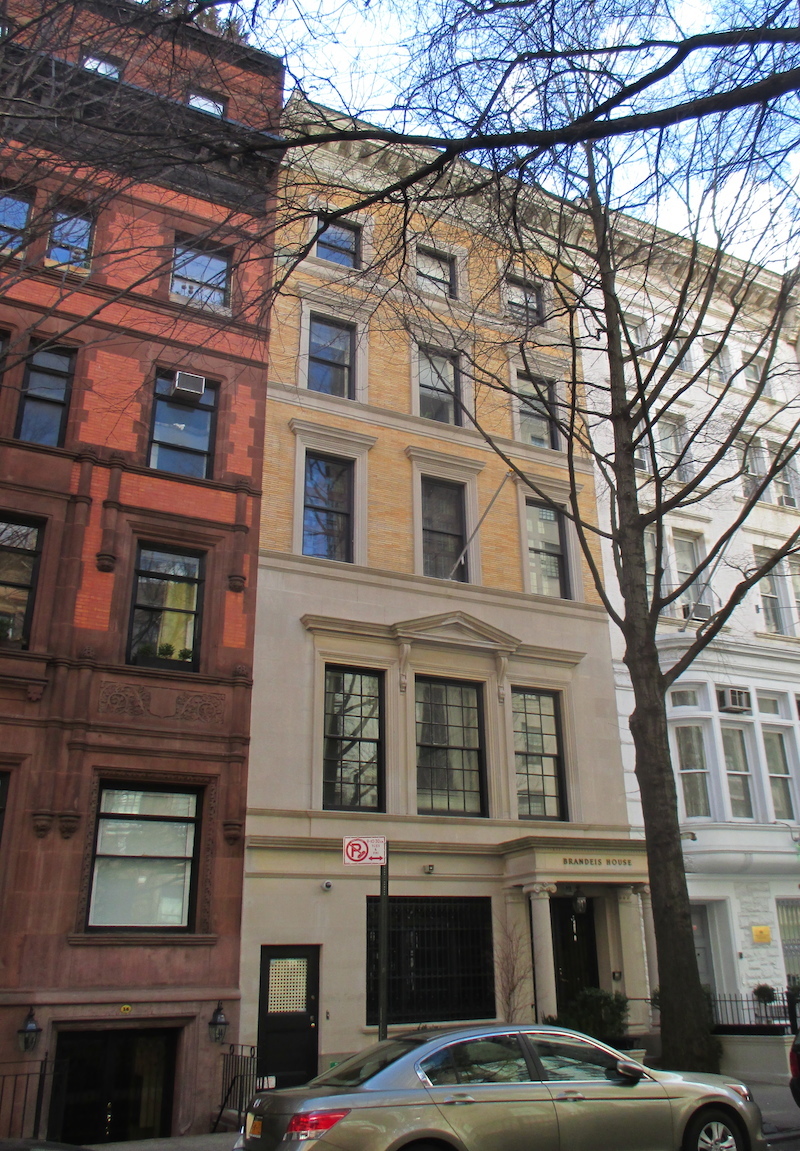 Today it is the Brandeis University Alumni House.
Today it is the Brandeis University Alumni House.
The eldest of William Henry’s daughters, Margaret Louisa, could not have had a more contrasting financial situation to her brother Cornelius. Her husband Elliot Fitch Shepard, managed to blow through the entire $5 million dollar cash portion of her inheritance by the time he died in 1893, leaving her with roughly a million dollars worth of real estate and physical property (primarily purchased with her money) and the income from her $5 million dollar trust fund to live on. But, oh what that income could buy!
 When it came time Margaret’s eldest daughter Maria Louisa to marry William Jay Schiefflin in 1891 Mrs. Shepard gave the couple quite a handsome fully furnished townhouse as a wedding present at 35 West 57th St., which still stands today.
When it came time Margaret’s eldest daughter Maria Louisa to marry William Jay Schiefflin in 1891 Mrs. Shepard gave the couple quite a handsome fully furnished townhouse as a wedding present at 35 West 57th St., which still stands today. Although the ground floor has been altered for commercial use, the upper floors can give one an idea of the grace and scale of the home. Even more impressive, several years later Margaret purchased 2 sets of adjoining brownstones at 5 East 66th Street and 11 East 62nd street. On the 66th street site, she had the architectural firm of Hunt and Hunt erect an elegant, doublewide French Renaissance mansion, which she gifted to the fortunate Schiefflins.
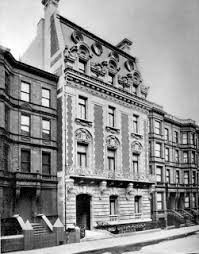 They lived there until 1925, when they decamped for an apartment in 620 Park Avenue.
They lived there until 1925, when they decamped for an apartment in 620 Park Avenue. The house then went through several owners, until purchased by the Lotos Club in 1947, who owns it today.
The house then went through several owners, until purchased by the Lotos Club in 1947, who owns it today.
On the 11 East 62nd street site, an even grander, more baroque mansion rose,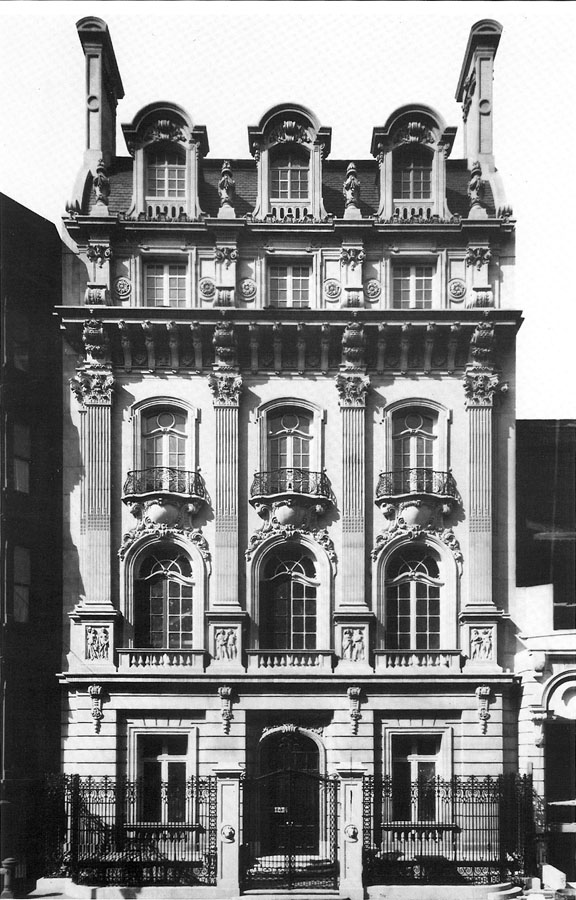 which Margaret in turn gave to her daughter Edith, who had married Ernesto Fabbri.
which Margaret in turn gave to her daughter Edith, who had married Ernesto Fabbri.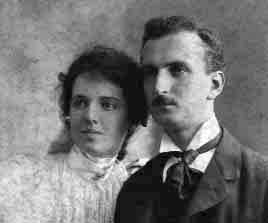 The Fabbris lived in the house until they moved to Europe for several years, leasing their mansion to the Harrimans, the Ledyard Blairs, and their cousin Alfred among others. After their return to America, whether tired of the baroque excess of their mansion, or inspired by the pared down style of villas in Italy, the couple decided to sell their home in 1912 and bought a large lot at 7 East 95th street. On this site, architect Grosvenor Atterbury designed a pared-down, handsome red brick mansion for the couple.
The Fabbris lived in the house until they moved to Europe for several years, leasing their mansion to the Harrimans, the Ledyard Blairs, and their cousin Alfred among others. After their return to America, whether tired of the baroque excess of their mansion, or inspired by the pared down style of villas in Italy, the couple decided to sell their home in 1912 and bought a large lot at 7 East 95th street. On this site, architect Grosvenor Atterbury designed a pared-down, handsome red brick mansion for the couple. In 1949, Edith Fabbri deeded the house to the Episcopal Church, which today serves as the House of the Redeemer. Meanwhile, the Fabbri’s original mansion also went through a series of owners, and today is owned by the Japanese Government.
In 1949, Edith Fabbri deeded the house to the Episcopal Church, which today serves as the House of the Redeemer. Meanwhile, the Fabbri’s original mansion also went through a series of owners, and today is owned by the Japanese Government.
 Margaret’s youngest daughter Alice married Dave Hennen Morris in 1895. Margaret strongly disapproved of the marriage and the couple essentially eloped, so no grand mansion was in the cards as a wedding gift. Quite on their own and quite contentedly, the couple set up housekeeping on the Upper West Side, which to a Vanderbilt must have been social Siberia, in a townhouse at 269 West 72nd street. Margaret, for all her conventions, was a kind woman who loved her daughter and eventually the relationship was healed. In 1909, the Morris’s were snugly back in the family fold, and snugly living in a new, handsome Italian Renaissance townhouse on East 70th street.
Margaret’s youngest daughter Alice married Dave Hennen Morris in 1895. Margaret strongly disapproved of the marriage and the couple essentially eloped, so no grand mansion was in the cards as a wedding gift. Quite on their own and quite contentedly, the couple set up housekeeping on the Upper West Side, which to a Vanderbilt must have been social Siberia, in a townhouse at 269 West 72nd street. Margaret, for all her conventions, was a kind woman who loved her daughter and eventually the relationship was healed. In 1909, the Morris’s were snugly back in the family fold, and snugly living in a new, handsome Italian Renaissance townhouse on East 70th street.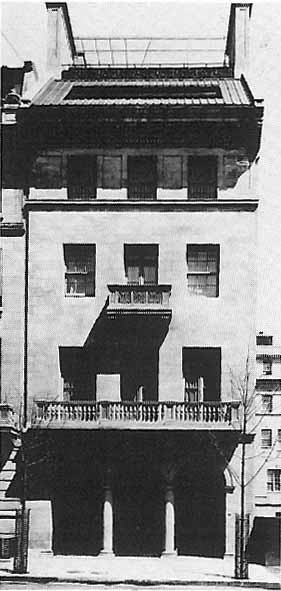
The only son of the Shepard family, Elliot Jr, spent a great deal of time in France, and died in Miami. I could find no record of any Manhattan residence.


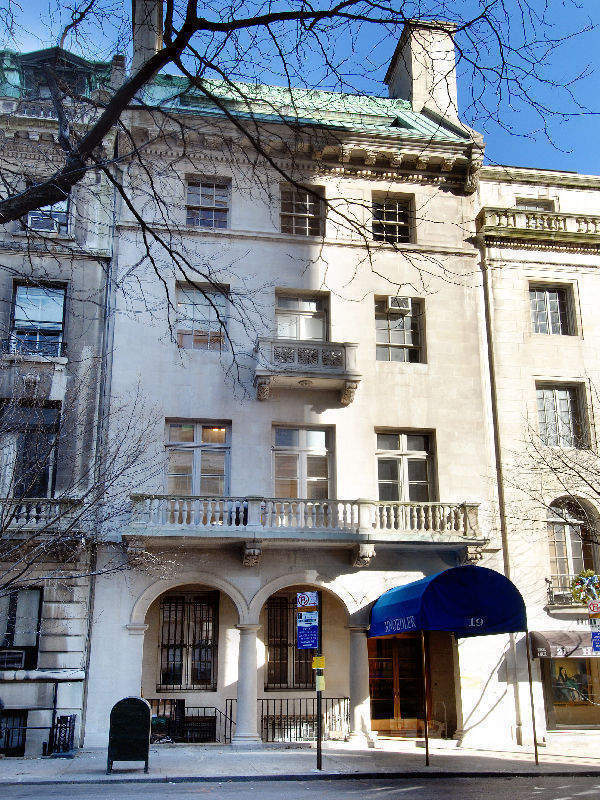 The sisters’ homes however, all stand remarkably intact today – a testament to how far the income from a 5 million trust could go in those days. For more specific reading on some of them, I suggest checking out the following links, on Big Old Houses, and Daytonian in Manhattan
The sisters’ homes however, all stand remarkably intact today – a testament to how far the income from a 5 million trust could go in those days. For more specific reading on some of them, I suggest checking out the following links, on Big Old Houses, and Daytonian in Manhattan
